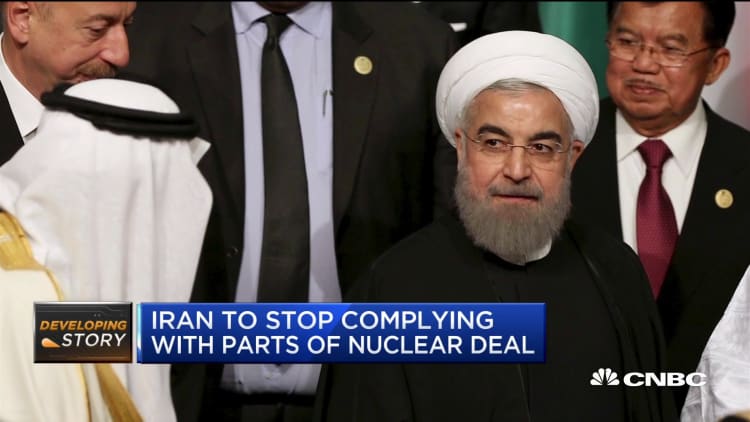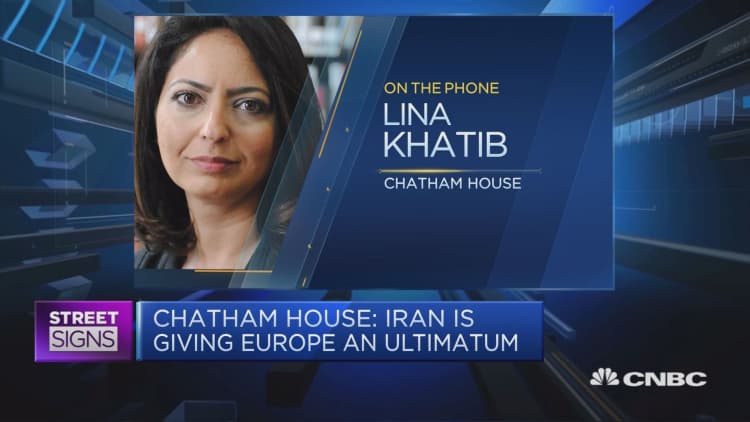
Iranian President Hassan Rouhani announced Wednesday his country would end its compliance with two particular conditions of the country's nuclear deal.
It comes exactly one year after President Donald Trump announced America's withdrawal from the deal that has since been on life support as European, Russian and Chinese signatories endeavor to save it.
Rouhani did not signal the end of deal entirely, but gave Europe an ultimatum: It will have 60 days to either follow the Trump administration or resume oil trade with Iran to save the agreement, violating U.S. sanctions. A failure to do the latter would prompt Tehran to return to high level uranium enrichment, the Iranian leader said.
"The path we have chosen today is not the path of war, it is the path of diplomacy," Rouhani said in a televised speech. "But diplomacy with a new language and a new logic."
Starting Wednesday, Iran will keep unspent enriched uranium instead of selling it, which it had been doing under the stipulations of the 2015 nuclear deal. This will help build its store of low enriched uranium and heavy water, which are used in nuclear reactors.
If Europe does not step up to save the deal and protect Iran's oil and banking sectors from U.S. sanctions, Rouhani said, it will restart construction of its Arak nuclear reactor, which was capable of producing weapons-grade plutonium and had been shut down as part of the 2015 deal.
Iran's level of uranium enrichment is said to be currently at just over 3%, as allowed under the nuclear deal for power generation. Enrichment needs to be at around 90% in order to build a bomb, from which Iran remains a long way away, experts say. But governments in the West fear Iran's atomic program could allow it to eventually build nuclear weapons, something at international bodies like the International Atomic Energy Agency and the UN said was being effectively prevented by the 2015 deal.

Russia blames US, Britain is 'extremely concerned'
Russian officials took news as an opportunity to criticize U.S. policy, blaming external pressure from Washington as the cause of Iran's roll-back of its deal commitments. Russian Foreign Minister Sergei Lavrov said Wednesday that he expects European signatories to fulfil their obligations under agreement.
Iranian Foreign Minister Javad Zarif told Lavrov on Wednesday that Tehran's decision was both legal and reversible. "The steps which we have taken today are within the framework of the agreement," he said from Moscow. "And they can be reversed. There's a 60-day window for diplomacy."
The U.K. warned of consequences if Iran ditches its obligations to the deal, with a spokesman for Prime Minister Theresa May saying, "We are extremely concerned about this announcement and urge Iran to continue to meet its commitments under the deal and not to take escalatory steps ... We will ensure (the deal) remains in place for as long as Iran upholds these commitments."
France reiterated its support for the deal, but warned that Iranian abandonment of its obligations would lead to possible triggering of sanctions mechanisms by Europe. EU member states have created a "special purpose vehicle" to skirt U.S. sanctions and continue doing business with Iran called INSTEX, angering the U.S., but the vehicle is said to have limited effectiveness.
French Defense Minister Florence Parly said in a local radio interview that the nuclear pact had been undermined for months.
"Today nothing would be worse than Iran, itself, leaving this agreement," she said.
Bomber task forces in the Gulf
Trump administration officials have warned of "troubling and escalatory threats" coming from Iran in recent days; on Sunday, U.S. National Security Advisor John Bolton announced the deployment of a carrier strike group and bomber task force to the Persian Gulf to send an "unmistakable message to the Iranian regime" against the use of force against U.S. interests.
Shortly thereafter, military experts and analysts pointed out that the ship's deployment to the region was likely routine and long-planned, with many speculating that the White House was using that as an opportunity to intimidate the Iranian regime.
The Iranian nuclear deal, enacted under the Obama administration along with Germany, France, the U.K., Russia and China, saw financial sanctions on Iran lifted in exchange for curbs to its nuclear program.

Since Washington's withdrawal last year and subsequent re-imposition of sanctions on numerous sectors of Iran's economy, most significantly its oil exports, the Islamic Republic's economy has fallen into deep recession. Its currency has tanked, scores of international companies have left the country and Iranians are struggling to afford basic goods.
For the Trump administration, the deal did not go far enough to address what it calls Iran's malign behavior, including its support of proxy militant groups around the region, ballistic missile testing, and human rights abuses.
Rouhani's announcement also comes just days after Washington allowed sanctions waivers on eight major Iranian oil importing countries to expire, putting further pressure on Tehran's main source of revenue as part of its "maximum pressure" campaign.


